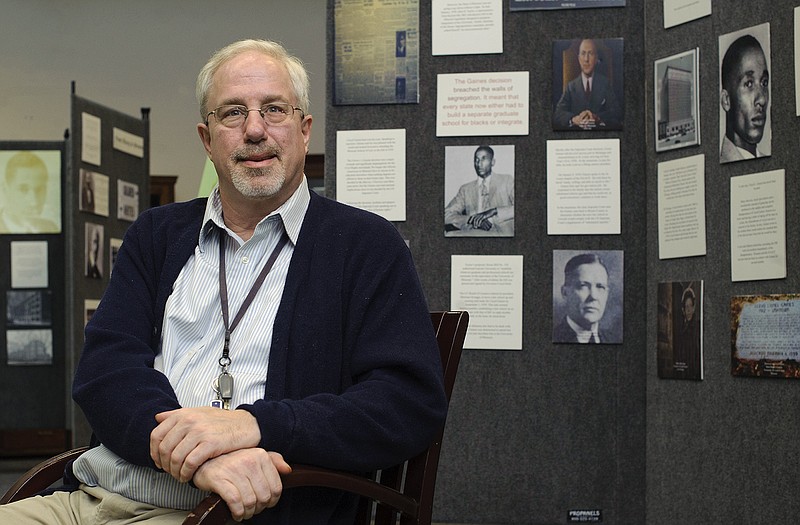Printed pictures taped to Mark Schleer's bookcases have curled edges for the repeated times he has pulled down the images to tell their stories.
That he is happy in his job as Lincoln University archivist and values the institution's history is obvious.
His speech quickens as he tells of Mallileau Woolfolk, who earned his high school diploma at age 27 and completed his bachelor's degree at Lincoln by age 30. Woolfolk became a psychology professor but only briefly before enlisting for World War II, becoming one of the 13 Tuskegee Airmen from Lincoln.
But there's more, and Schleer is excited to finish the compelling story about an alumnus he had never heard of before a call came to the archive from a lady researching the Tuskegee Airmen.
The more he found, the more he wondered how he had not heard about him.
"How many more do we not know about?" Schleer asked.
Woolfolk's story is completed when listeners learn after the war he earned a law degree and became one of the Harlem Civil Rights lawyers.
Another Lincoln story is in Lloyd Gaines, whom Schleer said he did know something about before becoming archivist. But after taking the job, he spent years researching a comprehensive display, which may be seen at the library.
"For me, that was a mission," he said. "I think more people should know about him."
What that research project taught him was the value of history's visual aspects. A historian by training, he said he was used to writing up reports. But to share the history with a broad audience, he began to focus on portraits and other images.
"I was sailing on uncharted waters, but I knew if you add a face to that story, it makes it more real," he said.
Schleer also has continued the work of digitizing Lincoln's extensive photograph collection.
In the last few years, he has been able to create informative displays such as the Legacy of Lincoln, the 90th anniversary of Lincoln Homecoming with pictures of all 90 queens, and the 80th anniversary of the Clarion. He has created about 30 exhibits in his seven years there.
Although he is working intensely this year on projects for Lincoln's 150th anniversary, his favorite time period is the 1920s through pre-integration, when the institution was a model Historically Black College and University and was referred to as "the black Harvard of the Midwest."
Schleer is collecting 366 pieces of history, which are being posted daily to Lincoln's Facebook page.
He is also teaching a Learning In Retirement class on the university's history and preparing a three-panel display of the campus's evolution.
"My biggest concern is letting students and the community know how Lincoln was able to last this long and be successful," he said.
Growing up as the fifth generation working at Schleer Brothers Hardware, 108 E. High St., his interest in history didn't come from the century-old business but from history teacher Mike Jeffries, he said.
After earning a bachelor's degree in history and political science, Schleer operated a booming DJ business, hitting regular spots including Veit's, Bones and Cordial's. In those days, he carried a lot of equipment to support his vinyl and tape cassette library.
"It's amazing how the technology for music has evolved. ... You don't have to worry about skipping if someone jumps too close to the DJ booth," he said.
While working as assistant manager at the record store at Capital Mall in the 1990s, Schleer was exposed to a variety of music styles, which he still enjoys.
"Thank God for shuffle," he joked. "I like jumping from genre to genre."
In his archive office on the top floor of Inman Page Library, Schleer generally has music playing - New Age, blues, rock "n' roll, jazz, reggae, classical, Gregorian chant and more from his digital library of about 25,000 songs.
In addition to listening to music, he plays the harmonica, at one time with a band.
"My philosophy on music is like history: it's linear," Schleer said. "You don't pull music out of thin air; it's influenced by something."
That outlook applies to his decades of competitive barbecuing, too, which he enjoyed with his brother and late father.
For several years, Schleer was a professional substitute teacher.
"I enjoyed being around the students and found academia more fulfilling" than retail, he said.
With encouragement, at age 45, he started taking classes part time at Lincoln hoping to fulfill a teaching certificate and earn a master's degree.
The summer between completing his master's degree and completing his student-teaching semester, a job offer changed his future.
Former Lincoln librarian Elizabeth Wilson offered him a manager's job at Page Library. It wasn't historical research and it wasn't teaching, but it "was still in that education spectrum," he said.
"When a student gets an idea, when they get that light-bulb moment - that's gold," Schleer said. "It's one of the best feelings I've ever had. And here, I get that a lot."
Schleer dove further into the unfamiliar when Wilson offered him the archivist job.
He quickly learned collection development, categorizing, preservation and grant writing.
"Wilson took a chance on me; that meant a lot," he said. "That's a theme of Lincoln University, founded by people offering an opportunity to their fellows to get an education, to better themselves.
"That seems to continue."
Schleer has been on campus long enough to watch "at-risk" freshmen - who have been told by people who matter to them that they will never amount to anything - grow into successful seniors crossing the stage for a diploma.
"That gives me hope."

